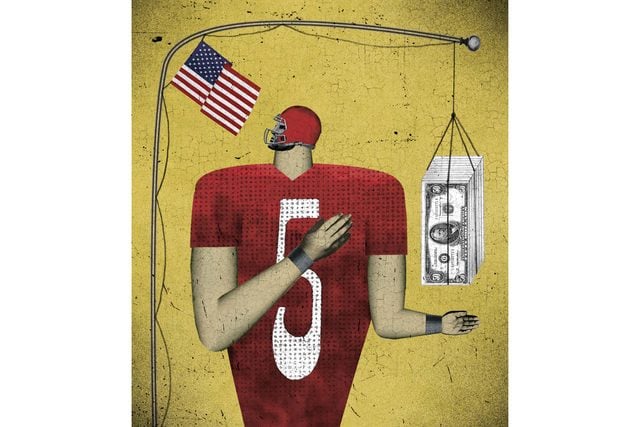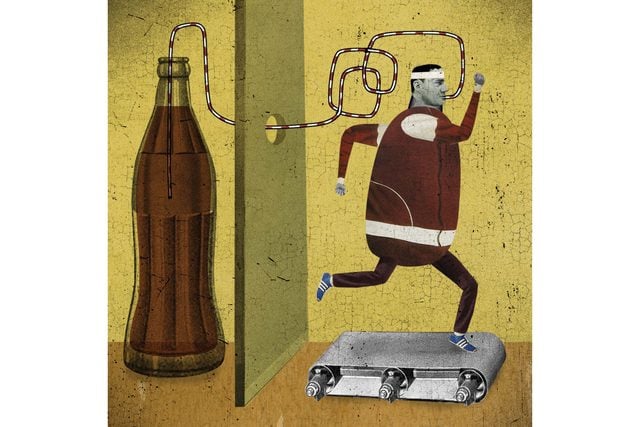Corporate Greed: These Companies Deceived America For Profit—And You Probably Helped Them
Updated: May 24, 2021
Some of the world's most respected corporations went out of their way to deceive us. Here's the fascinating way they got caught.

Theodore Roosevelt, who battled the excesses of the Gilded Age, was always careful to point out that he was not too hostile to corporations; rather, he was “endeavoring to do away with any evil in them.” Sorry, Teddy, but wrongdoing has not been expunged. The past few decades alone have seen the lies of tobacco companies exposed, Enron and Tyco collapse under the weight of malfeasance, and financial institutions that cooked the books lead us into the Great Recession. You might think that today’s large corporations would have learned from such misdeeds. As the following companies show, you’d be mistaken.

Volkswagen: Cheated to Beat Emissions Tests
The pitch: Volkswagen promised consumers that its diesel-engine cars were not only fuel efficient but also clean enough to meet U.S. Environmental Protection Agency air-quality standards. American consumers scrambled to get behind the wheel of Volkswagen’s “green diesels,” which combined high fuel economy, great performance, and the cachet of driving an eco-friendly European vehicle.
The hitch: American air-quality standards are very different from those in Europe. European emissions standards are more focused on greenhouse gases (carbon dioxide, primarily) and fuel economy, while U.S. standards are aimed at limiting smog and adverse health effects, so they target six principal pollutants, such as particulate matter and carbon monoxide. To span this divide, Volkswagen developed a secret sauce that allowed models to pass the EPA’s test.
The fallout: The secret sauce, it was revealed last year, turned out to be good old-fashioned cheating. Every Volkswagen diesel was equipped with a “defeat device”—software that detected when the car was undergoing emissions testing, says the EPA—that triggered a tightening of the car’s emissions-control system and allowed it to meet emissions standards in the lab. But as soon as the car came off the test treadmill, the engine snapped back to snazzy life, spewing up to 40 times the allowable limit of nitrogen oxide (NOX), which causes respiratory ailments, especially in fragile populations such as the elderly and young children with asthma.
The company has fessed up to the cheating, but that didn’t stop the EPA from going after it. In June, Volkswagen agreed to pay up to $14.7 billion to settle claims with dissatisfied car owners and to answer for violations of the Clean Air Act. If the engineers who designed the cheat told themselves they were hurting no one, they were wrong: Harvard and MIT scientists estimate that the added NOX emissions could cause about 60 early deaths in the United States alone.

Pro Sports Teams: Paid to Be Patriotic
The pitch: Sports stadiums are among the most patriotic places in America. There you might witness a tear-jerking surprise reunion of a soldier just home from Afghanistan with his family, on-field reenlistment ceremonies, Air Force flyovers, and more. It’s enough to put a lump in our throats and leave us thanking the individual teams for their commitment to our servicemen and -women.
The hitch: In 2015, it was revealed that what sports fans had assumed were genuine shows of support for the armed forces by teams in the NFL, the NBA, the NHL, Major League Baseball, and Major League Soccer had actually been business deals designed for profit. It wasn’t that the sports teams had never staged sincere shows of patriotism; however, it’s doubtful the fans would have responded so emotionally to all these spectacles had they understood that many of them were lucrative recruiting advertisements, paid for by the Department of Defense.
The fallout: Arizona senators Jeff Flake and John McCain launched an investigation and published a damning report on “paid patriotism.” They found that the National Guard, the biggest “advertiser,” had dropped millions on sports teams while simultaneously appealing to Congress for funding to meet a $100 million budget shortfall. (A typical example blasted by the senators: a $20,000 payout to the New York Jets to recognize local Army National Guard soldiers as hometown heroes on the video board, as well as Coaches Club access for the recognized soldiers and three guests.) The senators added that the DOD, operating with a “complete lack of internal controls,” couldn’t prove that paid patriotism had helped recruitment.
It’s certainly easy to be angry with the Department of Defense for wasting money on potentially fruitless advertising. But neither the leagues nor the individual teams should get a pass. After all, they were all too eager to benefit from our emotions. In response to the report, the Department of Defense issued new guidelines that banned paid patriotism. In May, after conducting an audit, the NFL announced it identified $723,734 spent between 2012 and 2015 that “may have been mistakenly applied to appreciation activities rather than recruitment efforts,” which would be returned in full to taxpayers.
Lumosity: Promised Unproven Benefits for the Brain
The pitch: As the U.S. population ages, Americans are becoming increasingly worried about dementia and Alzheimer’s. Many have seen parents or grandparents lose their dignity to mental decline and have said, “I’d give anything to ensure that never happens to me.” And then along came companies like Lumosity, with an alluring promise: Play some fun games designed by neuroscientists on your computer or phone and boost your brainpower.
Advertisements for Lumosity’s games—which cost $11.95 per month for a monthly plan or $299.95 for a lifetime subscription—referred to them as “improving your performance with the science of neuroplasticity,” which is the brain’s ability to respond to new challenges by forging new pathways and connections.
The hitch: The science-speak sounded good, but in fact, in 2014, 75 of the world’s top neuroscience researchers signed a consensus statement accusing “brain game” purveyors of handpicking data that was only tangentially related to the games being sold and using it to make claims that were “frequently exaggerated and at times misleading.”
While they did not mention Lumosity or any of the brain game companies by name, the scientists said that the industry claimed to offer consumers a scientifically grounded way to reduce or reverse cognitive decline, despite no compelling scientific evidence to date that it actually did. The neuroscientists argued that such claims ignored a “cornerstone tenet” of scientific psychology, which is that mastery of a single task cannot stand in for an entire capability. For example, if you get really good at remembering where the red cube was on the screen, it doesn’t mean that you’ll always remember where you put your car keys.
The fallout: This past January, Lumosity (without admitting to or denying any wrongdoing) agreed to a $50 million judgment from the Federal Trade Commission for lacking data to support its scientific claims. “Lumosity preyed on consumers’ fears of age-related cognitive decline,” said Jessica Rich, director of the FTC’s Consumer Protection Bureau. No other brain game companies were targeted. Was Lumosity singled out because it’s the largest in the industry? The FTC isn’t saying. However, it agreed to suspend all but $2 million of the total judgment, the amount Lumosity claimed it could afford, pending verification of financial records and as long as Lumosity agreed not to make any claims without reliable scientific evidence.
Coca-Cola: Sugarcoated News

The pitch: “There is virtually no compelling evidence” that fast food and sugary drinks cause obesity, said Steven Blair of Global Energy Balance Network in a video announcing the launch of that scientific research organization. Good health, claimed GEBN, is achieved when an individual balances calories consumed with calories burned.
The hitch: GEBN wasn’t exactly an objective source. In 2014, James Hill, PhD, of the University of Colorado had e-mailed Coca-Cola executives: “It is not fair that Coca-Cola is [singled] out as the #1 villain in the obesity world,” Hill wrote. “I want to help your company avoid the image of being a problem in people’s lives.” Coca-Cola contributed $1 million to support the creation of the organization. Hill and Blair gave obesity-related media interviews that put more emphasis on calories out than calories in, without any disclosure of their ties to Coke.
The fallout: After a New York Times article exposed the special relationship between Coca-Cola and GEBN, the two parted ways. GEBN soon shut down and returned the $1 million to the company. Coke’s CEO, Muhtar Kent, has acknowledged an “insufficient amount of transparency” and flaws in Coke’s approach to public health. The company’s chief science and health officer retired in the wake of the scandal, and Coke has since rolled out an oversight committee and a sales strategy that focuses on smaller cans and bottles.
This may not have been the first time the company has bungled in the public health sphere. According to the Times, back in 2001, Coca-Cola sponsored a campaign called “H2No,” in which waitstaff at some restaurants were trained to correct diners’ troublesome practice of ordering tap water instead of Coke.
Theranos: Exaggerated the Usage of its Technology
The pitch: In 2003, Theranos was a hot new start-up with a breakthrough technology so brilliant that it threatened to disrupt the medical industry. The company said it was able to test for dozens of conditions—from HIV to high cholesterol—with just a few drops of blood from a person’s pricked finger (as opposed to requiring vials of blood), thanks to Edison, its patented testing technology.
Big names like Henry Kissinger joined the board, and investors showered the private company with hundreds of millions of dollars. Last year, Forbes gave Theranos a $9 billion valuation and estimated the personal net worth of then-31-year-old founder and CEO Elizabeth Holmes, who owned a 50 percent stake in the firm, at a cool $4.5 billion.
The hitch: In 2015, anonymous former employees spoke to the Wall Street Journal and voiced concerns about Edison’s accuracy; they also claimed that the company had stopped using it and instead had resorted to industry-standard testing methods—the very methods the company had intended to replace. A Theranos spokesperson called the article “factually and scientifically erroneous.” A lawyer for the company told the Wall Street Journal that Theranos wasn’t yet using the Edison technology for all the tests it offered, calling that transition “a journey.” But that was not the end of concerns about Theranos. When federal authorities inspected one of its California labs, they found numerous violations, some of which were potential dangers to public health. In response, Theranos submitted a plan of correction to authorities.
The fallout: Despite reassuring the public that its tests were reliable, Theranos nullified or revised two years’ worth of Edison-generated results in May. (Theranos says that represents less than 1 percent of all of its test results.) What’s more, the Wall Street Journal reported that Theranos performed many of its tests using traditional methods. In June, regulators proposed sanctions that could require Theranos to shut down the discredited California lab and bar Holmes from owning or operating a laboratory for two years. Theranos announced that it would resolve the issues identified and had already taken “remedial actions,” such as shutting down the facility and rebuilding it from the ground up. But Holmes hasn’t given up on the technology. In August, she presented Theranos’s latest research in small-volume bloodwork to the American Association for Clinical Chemistry.
Was Theranos’s breakthrough technology really viable? Time—and investigation—will tell. Certainly the investment community has expressed its opinion: In July, Forbes reexamined Theranos and valuated it at a fraction of its previous worth. As for Holmes? Her net worth was also “downwardly revised,” to $0.
ExxonMobil: Obstructed Action on Climate Change
The pitch: “The risk of climate change is real and it warrants action. Ninety percent of emissions come from the consumption of fossil fuels.” Does this quote come from a fringe environmentalist? Nope. It’s from an ExxonMobil spokesperson speaking to us earlier this year. The oil giant has seen the light: The greenhouse effect imperils Earth.
The hitch: Thirty-five years ago, executives at ExxonMobil (then Exxon) considered how climate change could factor into decisions about new fossil fuel extraction, according to an e-mail from a former employee. Yet they continued to fund groups and individuals who debunked global warming. Last fall, the Union of Concerned Scientists released a trove of documents revealing just how deliberately the fossil fuel industry attempted to sway the public. One 1998 memo by the American Petroleum Institute, an industry group that is bankrolled by ExxonMobil and other oil and natural gas companies, laid out a strategy to get the public to “realize” the “uncertainties of climate change.” It would target high school science teachers, conduct a media campaign, and distribute “information kits” that included peer-reviewed papers emphasizing “uncertainty” in climate science.
The fallout: ExxonMobil now faces a probe by attorneys general in New York, Massachusetts, and the U.S. Virgin Islands over its past research statements about climate change. Dozens of other AGs voiced their support. ExxonMobil certainly isn’t the only oil company involved in trying to alter the public’s view. But ironically, it was its own internal memos that blew the lid off the scandal. In other words, Exxon was the one that got itself caught.
In 2009, it announced that it would no longer fund climate-denial groups. Yet, unlike BP and Shell, ExxonMobil remains a member of the American Legislative Exchange Council, which, while it acknowledges that climate change exists, is notorious for lobbying legislators to block action on it. A spokesperson for ExxonMobil maintains that the company’s contributions “do not constitute an endorsement of every policy position … by ALEC.”
Maybe not, but it was ALEC’s position on the climate that caused Google to sever ties with the organization: “The facts of climate change are not in question anymore,” Google’s then–executive chairman Eric Schmidt said. “They’re just literally lying.”